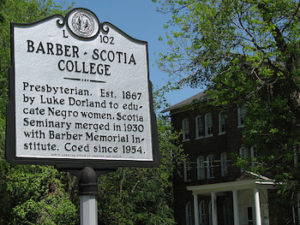
Barber-Scotia Seminary
*On this date in 1870, the State of North Carolina chartered Barber-Scotia Seminary, a learning institution for black girls.
Scotia was founded in 1867 as a strict prim Presbyterian school located roughly fifteen miles north of Charlotte in the cotton mill town of Concord, North Carolina. In 1932, responding to the wave of interest in junior colleges and greater responsibility for Black secondary education, Scotia merged with Barber College for Women in Anniston, Alabama.
The transformed school, Barber-Scotia College, was typical in essential functions, tuition, many secondary programs, and private sponsorship. Yet most of Scotia’s faculty held master's degrees, more than half were enrolled in college programs, and all were women.
Barber-Scotia modeled itself after Mount Holyoke Female Seminary in South Hadley, Massachusetts, with its reputation for independence, permanency, and intellectual firmness. The seminary subscribed totally to the head-hand-heart approach to educating young black people. Barber-Scotia fostered logical thinking and the acquisition of valuable information, notably through drills for mental development.
Scotia offered two curricula: a four-year grammar program in English, arithmetic, algebra, geography, science, history, and literature and a three-year standard and scientific program that included geometry, astronomy, physics, chemistry, history, Latin, and rhetoric.
Their industrial department taught sewing and cooking, and the students were involved in a housekeeping program to lessen operating expenses. It was an evolving pattern of post-secondary Black schools. Their first four-year degrees were awarded in 1945; two years later, it counted 157 students; in 1954, 191. Scotia was Black girls' first major boarding school in the defeated Confederacy. Past graduates from Barber-Scotia include Mary McLeod Bethune, Gertrude Brown, Mary Church Terrell, and Anna Cooper.
In a time of racial segregation, discrimination, and repression, Scotia offered the highest leadership training and education available in the South.
The African American Atlas
Black History & Culture an Illustrated Reference
by Molefi K. Asanta and Mark T. Mattson
Macmillan USA, Simon & Schuster, New York
ISBN 0-02-864984-2